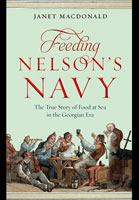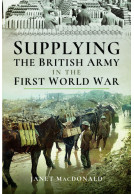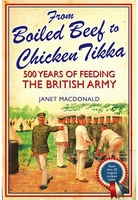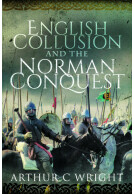Feeding Nelson's Navy (ePub)
The True Story of Food at Sea in the Georgian Era

File Size: 3.0 MB (.epub)
Pages: 224
Illustrations: 16 black and white
ISBN: 9781473835160
Published: 30th April 2014
Top Review
"Marvellous book." - The TelegraphThis celebration of the Georgian sailor's diet reveals how the navy's administrators fed a fleet of more than 150,000 men, in ships that were often at sea for months on end and that had no recourse to either refrigeration or canning. Contrary to the prevailing image of rotten meat and weevily biscuits their diet was a surprisingly hearty mixture of beer, brandy, salt beef and pork, pease, butter, cheese, hard biscuit and the exotic sounding lobscouse, not to mention the Malaga raisins, oranges, lemons, figs, dates and pumpkins which were available to ships on far-distant stations. In fact, by 1800 the British fleet had largely eradicated scurvy and other dietary disorders.
While this scholarly work contains much of value to the historian, the author's popular touch makes this an enthralling story for anyone with an interest in life at sea in the age of sail.
Feeding Nelson's Navy has a wider appeal than simply to naval history enthusiasts, as it should also interest anyone to whom the history of food, diet and medicine has relevance.
1805 Club's Kedge Anchor magazine - Spring 2022
Read or reread, this book - you will not regret it.
The popular image of food in the Royal Navy during the Napoleonic period involves biscuits alive with weevils and salt meat so hard it could be used for carving. As this study makes clear, that isn't a fair or accurate impressive. The author looks at the full range of issues involved with feeding the navy, from the administrative system that purchased the food, prepared it for sea, made sure it got to the ships and checked its quality, the type and quality of food and drink provided, how it was cooked, how it was eaten and the impact food had on the sailor's health.
historyofwar.org
MacDonald has gone back to the original sources for the many stories of poor quality food. Most of them turn out to be from much earlier periods, or related to specific events (some can even be traced back to Magellan's voyages of discovery in the early 16th century!). By the time of the Napoleonic Wars food was provided by the Victualling Board, an increasingly efficient organisation that managed to keep Britain's massive fleets feed all around the world.
One minor area of interest here is to discover how many areas are badly documented. This includes such essential items as how the men actually ate - we know that almost the entire crew ate at the same time, but can't be sure how they organised collecting food from the cooks, how many tables they had or where their utensils were stored. This is probably simply because the few common sailors who did write their memoirs didn't think something so mundane actually needed explaining.
The section on health is also interesting - especially for the detailed look at the anti-scurvy measures. These turn out not to have been quite as impressive or consistence as normally presented, with the essential fruits not always issued as a preventative measure, despite plenty of available evidence...
...There is a selection of recipes at the end that shows that some of the more notorious items were actually perfectly edible. The value of this sort of experimental food history is demonstrated by the reconstruction of a type of soup made by rehydrating pre-prepared cubes. These have often been described as being 'soapy', but turn out to be perfectly acceptable if the original ingredients are used.
MacDonald also looks at the more serious aspect of this topic - the complex administration system needed to provide the food, pay for it, assess it, and make sure that the correct qualities were issued.
Overall this is an excellent examination of this crucial aspect of British naval power, and I'm certainly going to try out some of the recipes.
Marvellous book
The Telegraph
A well-researched and scholarly read, which exposes much about the less familiar details of Nelson's campaigns. It is a thoroughly interesting book for anyone partial to picking up a book about life in the past on the seven seas.
Discover Your History
About Janet Macdonald
Janet Macdonald has published books on numerous subjects. Her first book on naval history was Feeding Nelson’s Navy: The True Story of Food at Sea in the Georgian Era; her second, the British Navy’s Victualling Board, 1793-1815: Management Competence and Incompetence. She took her MA in Maritime History at the Greenwich Maritime Institute, London, and her PhD at King’s College London, where she was awarded a Laughton Scholarship. Her thesis was on the administration of naval victualling. Her most recent books are From Boiled Beef to Chicken Tikka: 500 Years of Feeding the British Army, Sir John Moore: The Making of a Controversial Hero and Horses in the British Army 1750-1850.



















